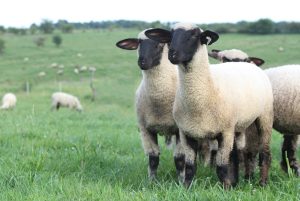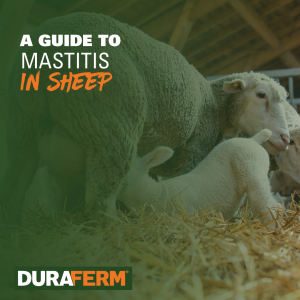
Sheep are interesting critters. From the outside, they don’t appear that complex – wooly, somewhat loveable and even picturesque as they dot the countryside grazing. However, as they are grazing, their inside is working to meet their nutritional needs. Sheep are herbivorous ruminants, meaning their diet consists primarily of plant material, and they have a specialized digestive system that allows them to break down fibrous vegetation efficiently. You are probably still wondering, what do sheep eat?
Understanding what sheep eat is crucial for their health, productivity and overall well-being. Their diet can vary based on their environment, nutritional needs and the season. Our DuraFerm® team compiled a comprehensive guide to what sheep eat, including their natural diet, supplementary nutrients and special dietary considerations.
You are probably wondering who is providing this advice. At BioZyme®, we specialize in vitamin and mineral supplements to strengthen your stock by supporting reproductive success and enhancing overall health. DuraFerm is a line of nutritional supplements for sheep and goats that promotes optimal digestion and nutrition for maximized performance at every production stage, from breeding to lambing.
The DuraFerm team knows we all want our flock set up for a healthy, high-performing, productive life. We created this resource about what to feed sheep to help producers optimize their flock.
What Do Sheep Eat?
As mentioned, sheep are ruminants with four stomach compartments that process and digest forage or roughage. Sheep primarily consume forages, including various grasses, legumes and shrubs. Their diet varies depending on their habitat and the availability of food sources.
Grasses
Grasses form most of a sheep’s diet, particularly in pasture-based systems. Some common grasses that sheep graze on include:
- Timothy grass – High in fiber and ideal for grazing.
- Bermudagrass – Common in warmer climates and provides good nutrition.
- Fescue – Hardy and resilient, though it should be consumed in moderation due to potential toxicity issues.
- Orchard grass – Palatable and nutritious.
- Ryegrass – Fast-growing and highly digestible.
Legumes
Legumes are often included in pastures since they offer higher protein content compared to grasses. Examples include:
- Alfalfa – High in protein and calcium, making it excellent for pregnant or lactating ewes.
- Red and White Clover – A good source of protein that should be fed with caution to prevent bloating.
- Lespedeza – A non-bloating legume often used for grazing.
You might wonder why protein is necessary in your sheep’s diet? Protein is vital for the ewes during lactation, the last phase of gestation and while growing baby lambs.
Browse & Shrubs
In some environments, sheep consume shrubs, tree leaves and woody plants. They may nibble on plants like blackberry bushes, young tree saplings and various native browse species. Typically, multispecies grazing is advantageous since sheep will eat what some species don’t and vice versa.
Weeds & Herbs
Sheep also graze on certain weeds and herbs, which can be beneficial as part of their diet. Some weeds are highly nutritious, while others should be avoided due to toxicity, which we address later on. Beneficial weeds include:
- Dandelions
- Chicory
- Plantain
- Milk thistle
Hay & Stored Forage
When fresh pasture is not available, particularly in winter, sheep rely on stored forage such as hay and silage.
Types of Hay
- Grass Hay – Commonly made from timothy, fescue or orchard grass.
- Legume Hay – Includes alfalfa and clover hay, which are higher in protein.
- Mixed Hay – A combination of grasses and legumes for a balanced diet.
Silage
Silage is fermented forage that provides energy and nutrients. While more commonly fed to cattle, sheep can consume silage as long as it is free from mold and properly fermented.
Concentrates & Grain
Forage is the primary component of a sheep’s diet. However, grains and concentrates can supplement their nutritional needs, particularly for growing lambs, pregnant ewes and lactating mothers.
Common Grains for Sheep
- Corn – A high-energy grain that should be fed in moderation.
- Barley – Easier to digest than corn and a good source of carbohydrates.
- Oats – High in fiber and safer for sheep’s digestion.
- Wheat – Can be included in small amounts but should be cracked or rolled.
Pelleted Feeds & Commercial Supplements
- Commercially formulated sheep feed provides balanced nutrition and may contain added vitamins and minerals.
- Pellets are convenient and reduce waste but should not completely replace natural forage.
Mineral & Vitamin Supplements
Sheep require certain minerals and vitamins to maintain peak health. These are usually provided through salt blocks, mineral mixes or dietary supplementation.
Essential Minerals
- Calcium and Phosphorus – Important for bone health and milk production.
- Magnesium – Prevents grass tetany, a metabolic disorder.
- Selenium – Necessary for muscle function but should be provided carefully to avoid toxicity.
- Copper – While essential in very small amounts, excess copper is toxic to sheep.
Vitamin Requirements
- Vitamin A – Needed for vision, growth, and reproduction.
- Vitamin D – Important for calcium metabolism and bone health.
- Vitamin E – Works with selenium to support immune function and muscle development.
- Vitamin B Complex – Synthesized by rumen microbes but may need supplementation in stressed or sick sheep.
Water Intake
Water is the most essential nutrient in any animal’s diet. It is vital to a sheep’s diet, as it aids in digestion, temperature regulation and overall health. Factors affecting water consumption include:
- Temperature – hot weather increases water needs
- Diet composition – dry feed increases water requirements
- Physiological state – lactating ewes need more water
On average, sheep consume 1-2 gallons of water per day, but this varies based on the factors above.
Toxic Plants & Harmful Substances
We’ve told you “what do sheep eat.” However, certain plants and substances are toxic to sheep and should be avoided. These include:
- Poisonous Plants – Ragwort, bracken fern, foxglove, oleander, yew and rhododendron.
- Moldy or Spoiled Feed – Can cause digestive issues and toxicity.
- Excessive Copper – Sheep are highly sensitive to copper toxicity.
- High Nitrate Plants – Some weeds and fertilizers can lead to nitrate poisoning.
Feeding Considerations Based on Life Stage
Sheep have different nutritional requirements depending on their age, reproductive status and workload. Protein requirements for sheep vary through each life stage. Pregnant and lactating ewes and growing lambs require additional protein.
Lambs
- Begin consuming grass and hay within a few weeks of birth.
- Creep feeding often accelerates growth.
- Need access to high-quality colostrum immediately after birth.
Ewes – Pregnant & Lactating
- Require additional protein and energy.
- May need grain supplements to support milk production.
- Increased demand for calcium, phosphorus and selenium.
Rams
- Require a balanced diet to maintain body condition.
- Should not be overfed grain to avoid urinary calculi (bladder stones).
Let DuraFerm Help Strengthen Your Stock
Perhaps instead of asking, “What do sheep eat?” you should ask, “What do sheep like to eat?” The answer: DuraFerm.
DuraFerm provides you with great nutritional supplements for your flock through all stages of production.
The following products are sheep supplements in the DuraFerm line you should consider when selecting a mineral for your flock.
DuraFerm® Concept•Aid® Sheep
DuraFerm Concept•Aid Sheep is a free-choice vitamin and mineral supplement for sheep designed to support reproductive success. The loose mineral comes in a 50-pound bag. It contains AO-Biotics® Amaferm®, a prebiotic research-proven to enhance digestibility.
This breeding mineral contains high levels of vitamin E for reproductive tract repair and supports embryo production and conception using organic trace minerals, including zinc, manganese, and selenium.
DuraFerm® Concept•Aid® HEAT® Sheep
DuraFerm Concept•Aid HEAT Sheep is a free-choice vitamin and mineral supplement for sheep designed to support reproductive success when temperatures are above 70 degrees Fahrenheit. It comes in a 50-pound bag and contains Amaferm to enhance digestibility.
DuraFerm Concept•Aid HEAT Sheep includes HEAT technology, a combination of essential oils and garlic, to support animals when heat and insects are a challenge. It supports embryo production and conception using organic trace minerals, including zinc, manganese, and selenium.
DuraFerm® Concept•Aid® Protein Tub Sheep
DuraFerm Concept•Aid Protein Tub Sheep is a protein tub with vitamins and minerals for sheep designed to support reproductive success. The 125-pound tub also contains Amaferm to enhance digestibility and the Concept•Aid sheep mineral package in a 16% natural protein tub.
This protein tub supports embryo production and conception using organic trace minerals and high levels of vitamin E. The tub is a great resource for pregnant and lactating ewes. Additionally, lambs can benefit from the tub, and they will start licking it, mimicking their mothers.
DuraFerm® ONE Sheep
DuraFerm ONE Sheep is a free choice vitamin and mineral supplement for sheep that promotes performance year-round. The newest product in our line, ONE, also contains Amaferm to enhance digestibility.
DuraFerm ONE Sheep meets or exceeds nutrient requirements throughout the production cycle. It is formulated with research-proven organic zinc for enhanced bioavailability and comes in a 50-pound bag.
Get your DuraFerm Today
Now that we’ve explored “what do sheep eat,” we are ready to help provide you with a quality nutritional supplement for your flock. If you can provide them with quality forage, we can provide you with a high-quality supplement to accompany that forage. The Amaferm within DuraFerm ensures that they absorb the maximum nutrients from the provided forages while enhancing digestibility.
You can purchase DuraFerm products powered by AO-Biotics Amaferm. DuraFerm is available through the extensive BioZyme dealer network. Locate a dealer near you today. DuraFerm offers reproduction resilience and retention. What more could you ask for?
You can also gather more information about DuraFerm from our educational blog series or by signing up for our newsletter.

